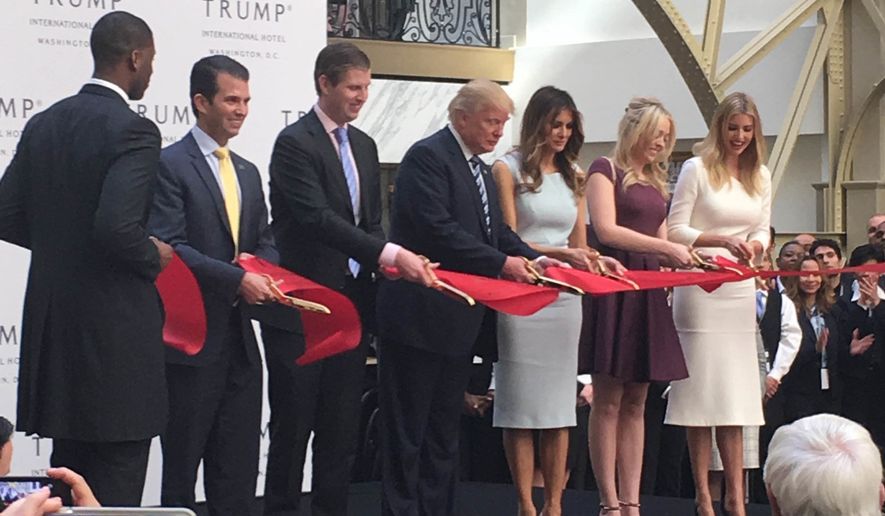President Trump’s proceeds from his business empire are “emoluments” under the Constitution, so a lawsuit challenging the president’s refusal to distance himself from his hotels can move forward, a federal judge ruled Wednesday.
District Judge Peter J. Messitte said Maryland and the District of Columbia have “convincingly argued” that Mr. Trump may be enriching himself from his hotels while serving as president.
The problem comes when customers are either U.S. government agencies or foreign governments — both of which are prohibited from enriching a sitting president under the Constitution’s two emoluments clauses.
Mr. Trump argued that neither hotel room rents nor the contract he signed to lease the government’s Old Post Office Building for a hotel in the District of Columbia rose to the level of the kind of compensation that would trigger the emoluments clause.
Judge Messitte, a Clinton appointee to the federal court in Maryland, rejected that argument.
“An ’emolument’ within the meaning of the Emoluments Clauses was intended to reach beyond simple payment for services rendered by a federal official in his official capacity, which in effect would merely restate a prohibition against bribery. The term was intended to embrace and ban anything more than de minimis profit, gain, or advantage offered to a public official in his private capacity as well, wholly apart from his official salary,” the judge wrote.
The ruling does not find Mr. Trump in violation; it says only that the case is plausible enough to proceed.
The judge previously ruled that the District and Maryland had standing to sue, but the latest ruling that income from Mr. Trump’s businesses amounts to emoluments clears an even bigger hurdle.
Lawyers involved in the case said it is the first time a federal court has grappled with this specific issue.
Mr. Trump, when he won the White House, announced he would step down from day-to-day management of the Trump Organization, leaving operations to his children.
But he did not divorce himself from it altogether and still shares in the revenue from the organization — including its hotels, food services and even its space.
Maryland and the District point to reporting that foreign governments and at least one state governor in the U.S. have sought to stay at the Trump International Hotel in the District, specifically because it is connected to the president.
The hotel space is leased from the U.S. government, the judge said, suggesting yet another avenue for additional compensation beyond what the Constitution and Congress have set for the chief executive.
D.C. Attorney General Karl A. Racine called the judge’s decision to let the case proceed a “substantial step” in the battle against Mr. Trump.
“We sued because this corruption is taking place in our backyard, and because 325 million Americans shouldn’t have to wonder if the president is putting his personal financial interests ahead of the national interest,” Mr. Racine said.
Mr. Trump’s business empire has drawn scrutiny ever since he announced his interest in running for the White House. His refusal to divest himself from his company left many critics complaining that he was using the White House to enrich himself and his family.
Sen. Richard Blumenthal, Connecticut Democrat, is pursuing another emoluments lawsuit in federal court in the District against Mr. Trump.
• Stephen Dinan can be reached at sdinan@washingtontimes.com.




Please read our comment policy before commenting.